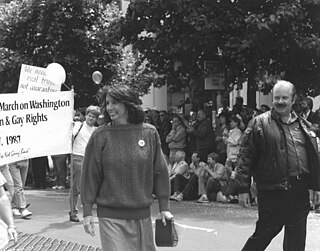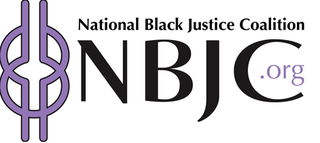Related Research Articles

The homophile movement is a collective term for the main organisations and publications supporting and representing sexual minorities in the 1950s to 1960s around the world. The name comes from the term homophile, which was commonly used by these organisations. At least some of these organisations are considered to have been more cautious than both earlier and later LGBT organisations; in the U.S., the nationwide coalition of homophile groups disbanded after older members clashed with younger members who had become more radical after the Stonewall riots of 1969.
Darlene Onita Garner is an American minister and LGBT activist, and a co-founder of the National Coalition of Black Lesbians and Gays (NCBLG). She was the first African-American elder in the Metropolitan Community Church and she helped create the denomination's biannual Conference for People of African Descent (PAD). In 2008 and 2009, she served as MCC Vice-Moderator. She is a nationally recognized speaker on LGBT religious issues; for instance, she was invited to join several other nationally known speakers to announce the "American Prayer Hour", a gay-affirming alternative to the "National Prayer Breakfast". For her work in the LGBT community, Garner was credited in The African American Almanac as "contributing to the visible image of gays in society" and in 2010 was named a "Capital Pride Hero" by Capital Pride.
The first National March on Washington for Lesbian and Gay Rights was a large political rally that took place in Washington, D.C., on October 14, 1979. The first such march on Washington, it drew between 75,000 and 125,000 gay men, lesbians, bisexual people, transgender people, and straight allies to demand equal civil rights and urge the passage of protective civil rights legislation.

The Second National March on Washington for Lesbian and Gay Rights was a large political rally that took place in Washington, D.C., on October 11, 1987. Its success, size, scope, and historical importance have led to it being called, "The Great March". It marked the first national coverage of ACT UP, with AIDS activists prominent in the main march, as well as making headlines the next day during mass civil disobedience actions at the United States Supreme Court Building.

The Gay and Lesbian Activists Alliance (GLAA) of Washington, D.C. is a United States not-for-profit organization that works to secure legal rights for gays and lesbians in the District of Columbia.

Melvin Boozer was an American university professor and activist for African American, LGBT and HIV/AIDS issues. He was active in both the Democratic Party and Socialist Party USA.

The National Black Justice Coalition (NBJC) is an American civil rights organization serving primarily Black lesbian, gay, bisexual, and transgender (LGBT) people. Since 2003, NBJC has collaborated with national civil rights groups and LGBT organizations, advocating for the unique challenges and needs of the African American LGBT community in the United States.

The following outline offers an overview and guide to LGBT topics.
D.C.Black Pride is the first official black gay pride event in the United States and one of two officially recognized festivals for the African-American LGBT community. It is a program of the Center for Black Equity (CBE) and is also affiliated with the Capital Pride Alliance. DC Black Pride is held annually on Memorial Day weekend.

The African-American LGBT community, otherwise referred to as the Black American LGBT community, is part of the overall LGBT culture and overall African-American culture. The initialism LGBT stands for lesbian, gay, bisexual, and transgender.
"Becoming Visible: The First Black Lesbian Conference" was held at The Women's Building in San Francisco, California, from October 17 to 19, 1980. It has been credited as the first conference for African-American lesbian women.
Pat Norman was an American activist for women's rights, as well as the rights of the African American and LGBT communities.
This is a timeline of notable events in the history of non-heterosexual conforming people of African ancestry, who may identify as LGBTIQGNC, men who have sex with men, or related culturally specific identities. This timeline includes events both in Africa, the Americas and Europe and in the global African diaspora, as the histories are very deeply linked.

In Washington, D.C., LGBT culture is heavily influenced by the U.S. federal government and the many nonprofit organizations headquartered in the city.

ABilly S. Jones-Hennin was an American LGBT rights activist based in Washington, D.C.
Gilberto Gerald, more commonly known as Gil, is an Afro-Panamanian activist, essayist and architect. He is known for HIV/AIDS activism, and LGBT rights in the United States.
Craig G. Harris was an African-American writer, poet, health educator, and HIV/AIDS activist.
References
- ↑ "LGBT Civil Rights, UW Madison". Archived from the original on 2011-09-30. Retrieved 2013-12-10.
- ↑ "ABilly S. Jones-Hennin". Archived from the original on 26 March 2021. Retrieved 15 Jun 2021.
- ↑ See this long interview with ABilly: Mason Funk (5 Aug 2016). "Outwords".
- ↑ "Rev. Delores Berry" . Retrieved 15 Jun 2021.
- 1 2 3 4 Alexander, Jonathan; Rhodes, Jacqueline (2015). Sexual Rhetoric: Methods, Identities, Publics. Routledge. p. 162.
- ↑ Stewart, Charles (2014). Proud Heritage: People, Issues, and Documents of the LGBT Experience. ABC-CLIO. p. 18.
- 1 2 "NCBLG: Making History", p.2, by Sidney Brinkley; at Blacklight Online, accessed 25 July 2010
- ↑ Rivers, Daniel Winunwe (2013). Radical Relations: Lesbian Mothers, Gay Fathers, and Their Children in the United States since World War II. UNC Press Books. p. 136.
- ↑ "The Down Low: New jargon, sensationalism, or agent of change?". 2007-03-26. Archived from the original on 2011-07-17.
- ↑ McCoy, Angela (1988). "NCBLG". Off Our Backs. 18 (1): 23.
- ↑ Beemyn, Genny (2014). A Queer Capital: A History of Gay Life in Washington, Part 3. Routledge. p. 207.
- ↑ Abdullahad, Tania (1982). "Third World Lesbian and Gay Conference". Off Our Backs. 12 (2): 4.
- ↑ "GFM Archive : Brochure for National Coalition of Black Gays (NCBG)".
- ↑ "Black/Out Magazine" (PDF).